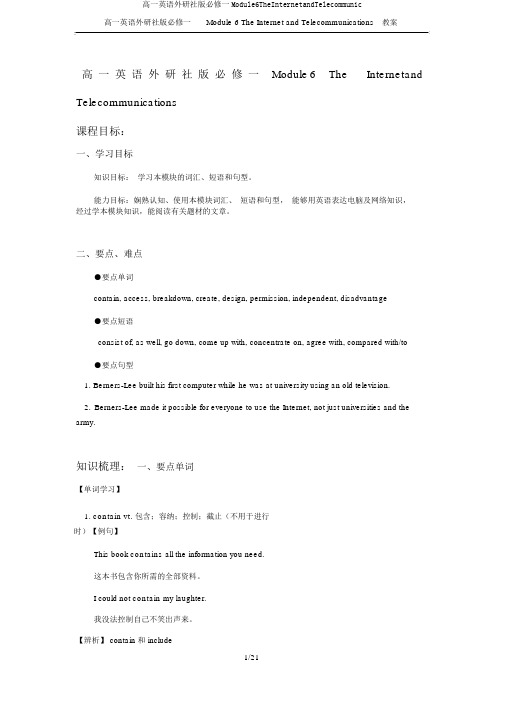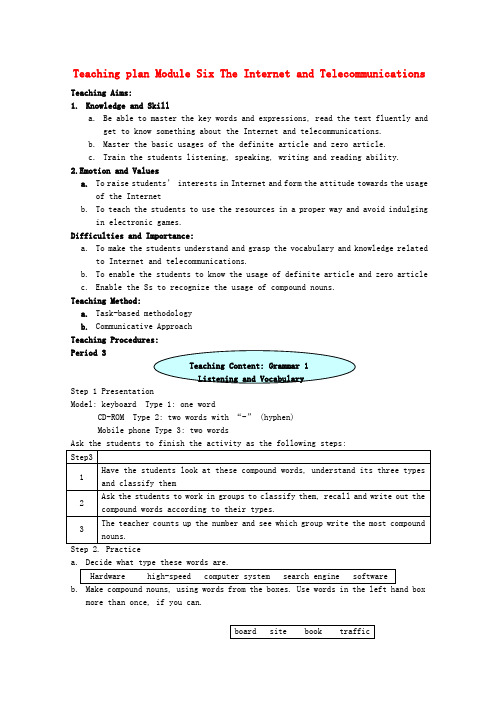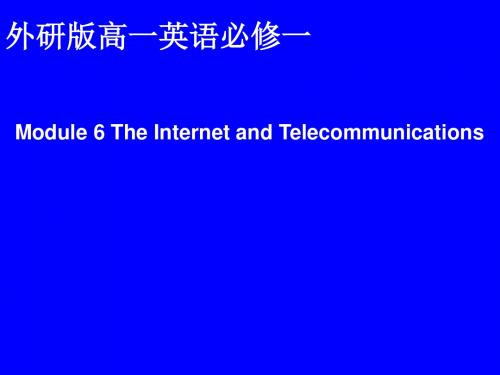外研版必修12020版高中英语Module6TheInternetandTelecommunications单元质量评估检测卷(六)
- 格式:doc
- 大小:126.19 KB
- 文档页数:21

高一英语外研社版必修一Module 6 The Internet and Telecommunications教案高一英语外研社版必修一Module 6 The Internet a nd Telecommunications课程目标:一、学习目标知识目标:学习本模块的词汇、短语和句型。
能力目标:娴熟认知、使用本模块词汇、短语和句型,能够用英语表达电脑及网络知识,经过学本模块知识,能阅读有关题材的文章。
二、要点、难点●要点单词contain, access, breakdown, create, design, permission, independent, disadvantage●要点短语consist of, as well, go down, come up with, concentrate on, agree with, compared with/to●要点句型1.Berners-Lee built his first computer while he was at university using an old television.2.Berners-Lee made it possible for everyone to use the Internet, not just universities and the army.知识梳理:一、要点单词【单词学习】1.contain vt. 包含;容纳;控制;截止(不用于进行时)【例句】This book contains all the information you need.这本书包含你所需的全部资料。
I could not contain my laughter.我没法控制自己不笑出声来。
【辨析】 contain 和 include1)contain 往常用来指某种容器中盛有某物,还指某种物质中含有某成分或含有其余物质。

Teaching plan Module Six The Internet and TelecommunicationsTeaching Aims:1.Knowledge and Skilla.Be able to master the key words and expressions, read the text fluently andget to know something about the Internet and telecommunications.b.Master the basic usages of the definite article and zero article.c.Train the students listening, speaking, writing and reading ability.2.Emotion and Valuesa.To raise students’ interests in Internet and form the attitude towards the usageof the Internetb.To teach the students to use the resources in a proper way and avoid indulgingin electronic games.Difficulties and Importance:a.To make the students understand and grasp the vocabulary and knowledge relatedto Internet and telecommunications.b.To enable the students to know the usage of definite article and zero articlec.Enable the Ss to recognize the usage of compound nouns.Teaching Method:a.Task-based methodologymunicative ApproachTeaching Procedures:Period 3Step 1 PresentationModel: keyboard Type 1: one wordCD-ROM Type 2: two words with “-” (hyphen)Mobile phone Type 3: two wordsAsk the students to finish the activity as the following steps:Step 2. Practicea.Decide what type these words are.b.Make compound nouns, using words from the boxes. Use words in the left hand boxmore than once, if you can.Step 3 Listening and vocabularya.Match the following words with their definitions.concentrate definite enjoy fantastic favourite usefulindependent make sure reason studio terribleb.Listen to three people answering the interviewer. Choose their opinions from thislist.1. Ann, the teacher, thinks that ________.A.everything on the Internet is useful for students.B.The Internet is a bad thingC.It’s important to help students find useful sites on the Internet2. Tom, the student, thinks that______.A. the Internet is the only place to studyB. the internet is a good place to studyC. it’s important to use the Internet as much as possible3. Pat, Tom’s mother, thinks that_____.A. Tom should only study from booksB. he spends too much time reading about football on the InternetC. using the Internet is a bad thingStep 4 DiscussionWork in groups and discuss the following questions.Homework: Finish the exercise 1,11,12,13 on page 97, 101。




Module 6 The Internet and Telecommunications学校校报在征集英语稿件,要求以“Myfavouriteinvention”为标题,描述你最喜欢的一种发明。
在所有的现代发明中,你最喜欢笔记本电脑(laptop),因为它重量轻,体积小,容易携带,随处可用,学习娱乐均可。
请根据以上内容写出征文。
MyfavouriteinventionWiththedevelopmentofscienceandtechnology,manynewinventionsmakeourdailylifeeasie randmore convenient.Amongalltheinventions,Ilikethelaptopbest.Ithink itisthemostamazinginventioninthe ptopsarelightandsmall,makingthemeasytocarry.Withalaptop,wecanwork,stu dyandentertainourselvesanywherewelike.AlaptopcangettotheInternet,whichenablesustoge tthelatestinformation ingalaptop,Ican keepintouchwith myfriendsandfam ilythroughe-mailsandQQ atanytime andinanyplace.Ithinkinthefuture,everybodywillhavehisorherownlaptop.1.文章体裁:说明文。
2.行文逻辑:引出主题→最喜欢笔记本电脑的原因→表达愿望。
3.词汇短语:运用了较高级的词汇和短语。
如:convenient(方便的),keepintouchwith(与……保持联系),atanytime(在任何时候)等。
Module 6 The Internet and Telecommunications Ⅰ. 模块教学目标Ⅱ. 目标语言Ⅲ. 教材分析与教材重组1. 教材分析本模块以Internet and Telecommunications 为话题,不仅要求学生了解有关电脑、网络、电信的词汇,而且要了解因特网的历史和电信业的迅猛发展及因特网在现代交际中的作用。
从情感上来讲,要求学生能正确地、客观地、辩证地看待因特网和现代通讯设备,积极利用因特网获取信息,使因特网能够更好地服务于自己的生活。
从语言知识上来讲,教师应帮助学生复习应用所学的构词法知识,熟练地组合新词汇,扩大词汇量。
从阅读角度来讲,要学会从文中获取信息,加工信息和准确筛选信息。
从写作角度来讲,利用本模块所学的词汇和短语,结合实际陈述自己对因特网的看法和意见,并学会如何陈述相反的观点。
在WORKBOOK 中要求对学校的设施做简单的介绍,并且对需要改进的地方提出自己的看法。
1.1 INTRODUCTION通过一幅电脑图片,要求学生说出并掌握电脑各部件的名称,学会用简单的英语来解释这些英语单词。
同时给出了许多新词汇,学生根据不同的语境来选择词义,为以后的阅读奠定基础。
1.2 READING AND VOCABULARY课文分六段三部分。
分别介绍了因特网、因特网的兴起、万维网和万维网的发明。
通过学习本文,学生可以了解到关于因特网和万维网的知识。
课后设置了正误判断题和选择题,旨在让学生从文中获取信息并能准确理解文章内容,同时帮助学生进一步巩固和掌握新词汇。
1.3 GRAMMAR1部分介绍了构词法知识——合成词的构成。
要求学生了解合成词的三种构成方式,并通过相关的练习学会运用名词的构成法猜测新词的意思。
1.4 LISTENING AND VOCABULARY通过一段采访录音,培养学生准确获取听力材料中有效信息的能力。
要求学生正确理解对话内容并推断不同说话者的观点和态度。
单元质量评估检测卷(六)(时间:120分钟满分:150分)第一部分听力(共两节,满分30分)第一节(共5小题;每小题1.5分,满分7.5分)听下面5段对话。
每段对话后有一个小题,从题中所给的A、B、C三个选项中选出最佳选项。
听完每段对话后,你都有10秒钟的时间来回答有关小题和阅读下一小题。
每段对话仅读一遍。
1.What can we know from the conversation?A.The man failed once.B.The man is good at his test.C.The man will fail again.2.Where does the conversation probably take place?A.In the woman's house.B.In the library.C.In a restaurant.3.How long will the woman walk along the street?A.60 metres. B.600 metres. C.6,000 metres.4.What did the woman do last night?A.Went to the theatre.B.Had a meeting.C.Had an interview.5.When will the woman pick up the man?A.At 1115. B.At 1100. C.At 1030.第二节(共15小题;每小题1.5分,满分22.5分)听下面5段对话或独白。
每段对话或独白后有几个小题,从题中所给的A、B、C三个选项中选出最佳选项。
听每段对话或独白前,你将有时间阅读各个小题,每小题5秒钟;听完后,各小题将给出5秒钟的作答时间。
每段对话或独白读两遍。
听第6段材料,回答第6、7题。
6.What's wrong with the woman?A.Having a fever.B.Feeling ill.C.Having a sore throat.7.What are the speakers doing now according to the conversation?A.Moving their house.B.Watching a film.C.Being on their holidays.听第7段材料,回答第8至10题。
8.Why does the man prefer cycling?A.It is quiet and relaxing.B.He can do it with his friends.C.He's fond of seeing the countryside.9.Which two sports does the man like best?A.Walking and basketball.B.Swimming and football.C.Table tennis and cycling.10.When does the man usually play table tennis?A.In winter. B.In spring. C.In summer.听第8段材料,回答第11至13题。
11.When was Ralph and Stefan's house robbed?A.Last month. B.Last week. C.Last night. 12.Why does the man think about his neighbours?A.They were careless.B.They were not in.C.It wasn't safe there.13.What will the speakers do next?A.Have a meal.B.Go to the cinema.C.Visit Ralph and Stefan.听第9段材料,回答第14至16题。
14.Where does this conversation most probably take place? A.At Tony's school.B.At the police station.C.At Mrs.Smith's home.15.How long has Tony been away from home?A.Two days.B.The whole afternoon.C.Almost a whole day.16.What does the man mean by saying the last sentence?A.The boy may know Tony.B.The woman should wait at home.C.The boy may be Tony.听第10段材料,回答第17至20题。
17.When was the university built?A.In 1977. B.In 1980. C.In 1983.18.How many books and magazines are there in the library?A.8,000,000. B.15,000,000. C.20,000,000.19.How many books and magazines can a student borrow each time?A.Two books and three magazines.B.Seven books and three magazines.C.Three books and two magazines.20.How long can the teachers keep the books and magazines?A.A month. B.Two weeks. C.Two months.录音材料:Text 1M: ①I will have a driving license test again tomorrow. I learned it hard last time, but got an F.W: Don't worry. I'm sure you'll do better tomorrow.Text 2M: ②Which salad do you prefer, steak salad, fruit salad, or chicken salad?W: ②I'll have whichever salad that doesn't have meat in it.Text 3W: Excuse me! Can you tell me how to get to Scotland Bank?M: ③Just at the corner of the Scott Street, you will walk for six hundred metres along this street.Text 4M: You didn't go to the theater last night either, did you?W: No.④I had an interview with a famous singer from Australia for over three hours.Text 5W: I'll come and pick you up around 1030, okay?M: Oh, I've got football practice until 1000.I won't be ready until 11 00.W: Okay,⑤I'll give you an extra fifteen minutes just to make sure you're ready.Text 6M: ⑥Are you feeling better now, honey?W: ⑥No. That medicine hasn't helped.⑦Not a good start to our vacation, I'm afraid.M: Do you have any idea what caused it?W: Well, I thought it might be the dinner we had at a stall last night.M: But I'm OK. Could it be the cold? It's enough to make anyone ill.W: I know. But we've been here a week now. Anyway, I've been careful in the snowstorm and I've worn a down jacket all the time.M: Then we'd better stay in the house today.Text 7W: What's your favourite sport?M: It's difficult to say—⑨I like many sports but I think I like football best, because I can play in a team. How about you?W: I don't like football. It's a boys' game, I think. Walking is quiet and relaxing. Do you like it?M: No, I seldom do that. ⑧I prefer cycling to walking. I enjoy seeing the countryside. Besides, it's faster.W: I've heard that you are good at swimming.M: Ah, yes. ⑨Swimming is my second favourite. It gives me a chance to have fun with my friends, especially in summer. ⑩But in winter I usually play table tennis. It's such good exercise.Text 8M: Kelly, we're going to see a film tonight, aren't we?W: That's right. Did you check the timetable as I asked?M: Yes, I did. The film starts at 730. We should go out to eat before that, shouldn't we?W: Sure! ⑪Ralph and Stefan next door had their house robbed last week.M: Oh, their house got robbed, did it?W: What do you mean?M: Well, ⑫they aren't exactly careful with their home safety, are they?W: No, I suppose not. Well, that won't happen to us, will it? And I'm hungry now.M: Hopefully not. ⑬Let's go to your favourite restaurant.Text 9M: Good evening, madam. Can I help you?W: Yes. It's about my son Tony. ⑮He went to school this morning but hasn't been back yet and it's 600 p.m. now.M: Just a moment, please. May I have his name?W: Tony Smith, 112 Broadway.M: Thank you. Now Mrs.Smith, what is the matter exactly?W: Well, ⑮Tony left home at 7 o'clock this morning, but just now his teacher called me and asked why Tony didn't go to school.M: Do you think it's possible that he went to a friend's home?W: I don't think so. I called his friends and our neighbors, but none of them have seen Tony today.M: I see. Now, let's move to some details. How old is he?W: 10 years old. And he is 1.5 meters tall.M: What's he wearing?W: A blue shirt, and white shoes, carrying a green school bag.M: We'll do our best to find him, Mrs.Smith. ⑭Let me show you out of the station.⑯But wait! Look at the boy standing at the gate and isn't he...?Text 10Good morning, boys and girls. Welcome to our Science Library. ⑰The library was built in 1980, so its history is only three years shorter than that of our university. It cost nearly $800,000 to build it. It is the largest library in our city, ⑱and there are 15,000,000 books and magazines in it. No matter what subject you are interested in, I'm sure you can find a book or a magazine to help you with your study. The library is open to all the students and teachers in our university. ⑲Students can borrow three books and two magazines each time and keep them for two weeks. ⑳As for the teachers, they can borrow seven books and three magazines and keep them for a month. If you can't finish your books or magazines on time, just come and renew them. However, if you lose a book or a magazine, I'm afraid you'll have to pay the same amount of money as the price.参考答案:1.A 2.C 3.B 4.C 5.A 6.B 7.C 8.C 9.B 10.A 11.B 12.A 13.A 14.B 15.C 16.C 17.A 18.B 19.C 20.A第二部分阅读理解(共两节,满分40分)第一节(共15小题;每小题2分,满分30分)阅读下列短文,从每题所给的A、B、C和D四个选项中,选出最佳选项。